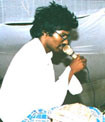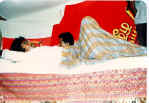| Reasons for Thileepan's fast | |||
|
His demands were: withdraw Sinhalese army camps from Tamil areas, suspend all rehabilitation work until the formation of an interim (Tamil) government for the Tamil homelands, stop the continuing Sinhala colonisation in the Tamil homeland, halt the setting up of Sinhala-manned police stations in Tamil areas and release all detainees held under the Prevention of Terrorism Act. ****************************************************************************************** Lt. Col. Thileepan
Lt. Col. Thileepan was in charge of the LTTE's political wing in Jaffna during the mid eighties. He worked relentlessly to mobilise the Tamil public and became a popular figure. He was also a courageous fighter and his conduct under fire inspired the Tiger troops. When the Indian and Sri Lankan governments signed the Indo-Lanka accord in mid 1987, the Tamil people were undecided as to whether the treaty was to their benefit or not. Many Tamils subscribed to the idealistic view of 'Mother India' looking after their interests, yet were perplexed by the LTTE's reservations. When large numbers of Indian troops arrived on the island, the Tamil people initially viewed them as 'liberators' from the excesses of the Sri Lankan army, even though the Indo-Lanka accord was primarily aimed at securing Indian strategic objectives in the region and the ending of Tamil nationalism on the island. Many Tamil concerns guaranteed by the Indian government (such as the Sinhala colonisation of the Tamil homelands) continued to persist and the Tamil people started to realise that things had not improved. However, many were fearful of challenging the mighty Indian state and in any case, the Tamils believed that India would protect their interests in the end. In an effort to persuade the Indian government to honour its obligations (or perhaps to force Delhi to reveal its hand) Lt. Col. Thileepan began a fast-unto-death on 15 August 1987 in the grounds of the Nallur Kandaswamy temple. Notably, as well as refusing to eat, Thileepan wouldn't drink water either. His d The Sri Lankan and Indian governments ignored his protest. As the days went by, the Tamil people watched Thileepan grow weaker and weaker. Within days, public concern had turned to alarm, though most Tamils felt that there would be a last minute gesture from the Indian government. On 26 August 1987, Thileepan died. His death sparked widespread anger across the Tamil homelands which translated into zealous support for the Tamil Tigers. A few weeks later, the LTTE went to war against the Indian government, which was now viewed as collaborating with the Sinhalese regime in Colombo. Despite deploying over 100,000 troops on the small island (as many as the Soviet Union deployed in all of Afghanistan), the 4th largest army in the world was forced into a retreat after 3 years. The LTTE, which was two thousand strong when the Indian forces arrived, had over five thousand men and women under arms when the Indians withdrew. Thileepan's death was significant as he almost single-handedly united the Tamil people behind the LTTE by highlighting the Indian government's lack of concern for the Tamils' rights in pursuit of its strategic interests. The Indian government's contempt for a Gandhian-style protest won more hearts and minds for the Tigers than they could have envisaged.
Each year, the Tamil people mark the anniversary of Thileepan's death. Sports events, literary contests, science and art exhibitions and other public events take place across the Tamil homelands in his honour. Some people fast in remembrance and many others undertake voluntary work. The Tamil expatriate communities across the world also mark this period. It is also a time during which the LTTE strengthens its 'grass roots' support in the Tamil homelands and abroad, building on Thileepan's last words: "Let the Tamil peoples' war erupt". Referenced: Tamil Canadian and The Broken Palmyra http://www.tamiltigers.net/fallencomrades/bio1.htm
Martyr Thileepan
He passed away in full view of a hundred thousand or more pairs of tear-filled eyes, Fasting in steadfast defiance of violence of seventy thousand misguided gun-toting guys, Consuming not even water for eleven whole days, not just his rice, Bettering the Gandhian device to recapture human liberty through self-sacrifice.
His nation had tried for forty years not once, not twice, not thrice but umpteen times to entice the oppressors with compromise plans, interim pacts, sensible advice, but all these were frozen like inert ice. Thileepanís was pacifism against vice, with arms withheld as a last resort, as the ultimate face in the political dice. He exhaled national fire in slow breaths and passed vigour and fierce velocity to Tamil cubs, once timid and shy as mice, And now lives as the sinew and blood of armies of pouncing tigers pursuing national pride and peace and a national paradise. - by Professor Kopan Mahadeva Hot Spring Oct'98 |
|||

 emands
were that the Indian and Sri Lankan governments withdraw Sinhalese army
camps from Tamil areas, stop the continuing Sinhala colonisation in the
Tamil homeland, suspend all rehabilitation work until the formation of
an interim (Tamil) government for the Tamil homelands, halt the setting
up of Sinhala manned police stations in Tamil areas and release all
political detainees.
emands
were that the Indian and Sri Lankan governments withdraw Sinhalese army
camps from Tamil areas, stop the continuing Sinhala colonisation in the
Tamil homeland, suspend all rehabilitation work until the formation of
an interim (Tamil) government for the Tamil homelands, halt the setting
up of Sinhala manned police stations in Tamil areas and release all
political detainees.
